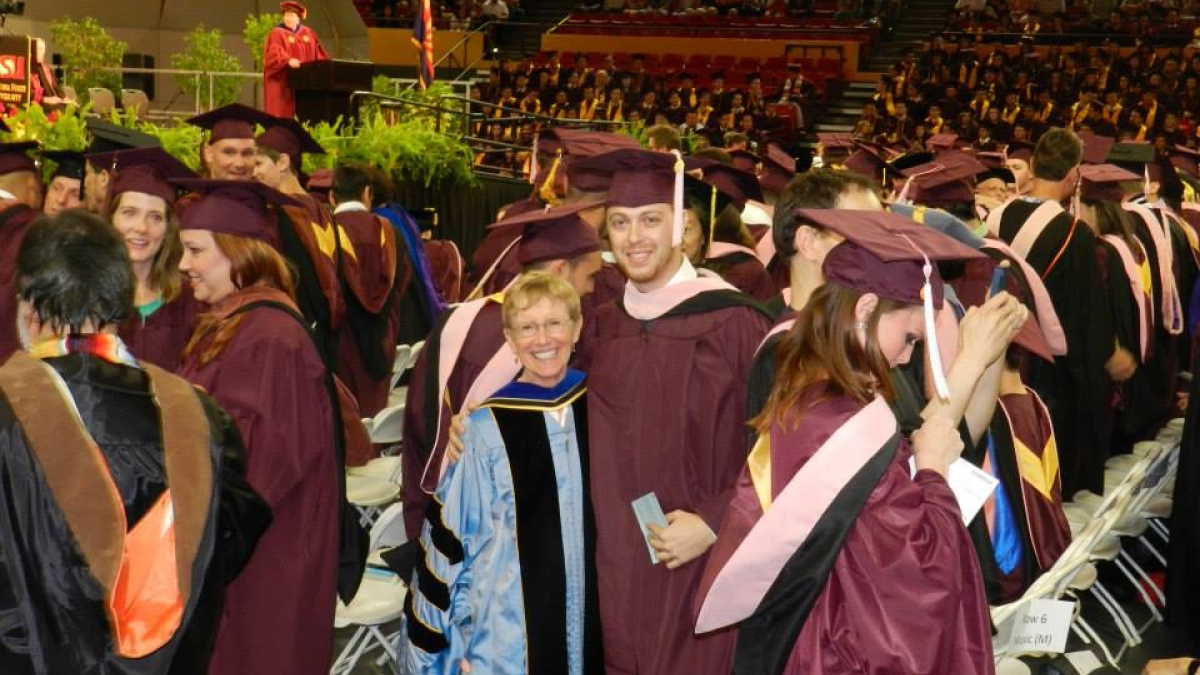Assessing creativity earns ASU alum outstanding research award

Creativity has a simple definition: having the ability to make new things or think of new ideas. But actually judging what is “creative” is not so simple.
For students in artistic subjects such as music, art and drama, of which creativity is an integral part, should their teacher be the one to fairly judge what is creative and what isn’t?
This was the question that Patrick Cooper, 2014 graduate of the ASU master’s in music education program, asked himself as he worked on the analysis that earned him the 2015 “Outstanding Emerging Researcher Award,” given by the Center for Music Education Research at the University of South Florida. The award is an international recognition given biennially to music educators in the early stages of their careers who are producing high-quality research.
Cooper was presented the award Feb. 7 at the 2015 Suncoast Music Education Research Symposium, where he also presented his paper.
His winning research is on measuring creativity using a consensual assessment technique with an assortment of judges – in this case, music teachers, non-music-teacher adults and peer students – to evaluate the compositions written by students in his sixth-grade string classes.
First championed in a 1982 essay by Harvard professor Teresa Amabile, the consensual assessment technique has often been called the “Gold Standard” of creativity assessment. The key to this method’s accuracy is that it measures creative works individually and in isolation by the group of judges, whose views are collected so that an overall rating can be established. The judges are experienced in the domain being assessed, and subjective viewpoints and preferences are taken into account, since everyone has a different view of what is creative.
Cooper said he had been interested in creativity for some time and wanted to know more about how to encourage creativity from his students.
"One of the first theories I studied suggested that perhaps creativity only exists from expert artists and that a typical student in a classroom lacks the ability to be creative. I vehemently opposed this theory, believing it cynical and counterproductive to an educational experience, so that is when I turned toward finding research on creativity assessment,” he said.
The results of Cooper’s research validate the consensual assessment technique and also demonstrate that music educators are likely reliable judges of students’ musical creativity, compared to other groups of evaluators.
The typical music education system is lacking opportunities “for students to create, explore and share in many music education classes,” Cooper said. “Current research is showing a decline in elective music participation, and I believe that to be a direct result [of] how we’ve been preparing musicians in our classes. … I truly believe that content knowledge and skill acquisition can be achieved through approaching music in more of a collaborative way between student and teacher in lieu of the image of a conductor standing on a podium barking orders at novice music makers.”
Being selected for this award came as a shock to Cooper.
“I knew I had a good piece of unpublished research,” he said, “but I never dreamed that when I submitted it that I would win. It validated my feelings that I belonged as a researcher in the music education field and that I had something to offer to the music education community.”
Cooper credits the music education faculty at ASU with playing a critical role in his accomplishments.
“They are a group of such dedicated, caring and supportive individuals,” he said. “They’ve fostered an atmosphere of community and family at ASU that I am proud to represent and be a part of. Nothing is achieved alone, and it wouldn’t be fair if I did not acknowledge them as a huge reason for my recent successes.”
Sandra Stauffer, ASU professor of music education and researcher with a focus on the musical creativity of children and youth, said that Cooper’s award is particularly prestigious because “previous winners of this award have been university music faculty members … and Cooper conducted the study in his school while enrolled in the ASU master’s degree in music education.
“His paper was a project for one of his classes, and is an excellent example of use-inspired research,” Stauffer said.
As for his future plans, Cooper said that “receiving this award has made me commit 100 percent to working on a PhD.” He intends to enroll in the ASU School of Music’s doctoral music education program in fall 2015.
Cooper currently teaches music at Athlos Traditional Academy in Chandler.
Read more about Cooper's research and award in The East Valley Tribune
Heather Beaman, heather.beaman@asu.edu
School of Music
(480) 727-6222